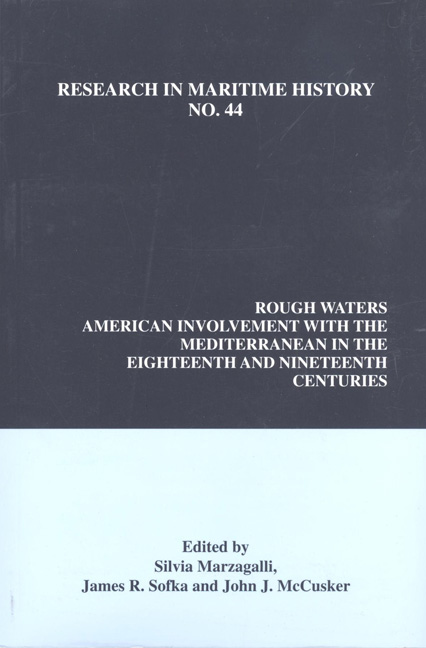Book contents
- Frontmatter
- Contents
- About the Editors
- Contributors' Notes
- “Rough Waters: American Involvement in the Mediterranean in the Eighteenth and Nineteenth Centuries: An Introduction”
- “Worth a War? The Importance of the Trade between British America and the Mediterranean”
- “Relations between North America and the Italian Peninsula, 1763-1799: Tuscany, Genoa and Naples”
- “American Shipping into the Mediterranean during the French Wars: A First Approach”
- “Notes toward a Franco-American Mediterranean 'From Below'”
- “Consuls and Consiglieri: United States Relations with the Italian States, 1790-1815”
- “Old and New Republics: Diplomatic Relations between the Republic of Genoa and the United States of America”
- ‘“From the Halls of Montesuma, to the Shores of Tripoli:’ Antoine Zuchet and the First Barbary War, 1801-1805”
- “Minorca: The First United States Naval Base in the Mediterranean and the American Consulate at Port Mahon”
- “‘The Jeffersonian Idea of National Security’ Revisited”
- “The Reluctant Warrior: Thomas Jefferson and the Tripolitan War, 1801-1805”
- “Slavery as Social Mobility? Western Slaves in Late Eighteenth Century Algiers”
- “Americans in the Mediterranean in the Late Eighteenth and Early Nineteenth Centuries: Concluding Remarks”
“Notes toward a Franco-American Mediterranean 'From Below'”
- Frontmatter
- Contents
- About the Editors
- Contributors' Notes
- “Rough Waters: American Involvement in the Mediterranean in the Eighteenth and Nineteenth Centuries: An Introduction”
- “Worth a War? The Importance of the Trade between British America and the Mediterranean”
- “Relations between North America and the Italian Peninsula, 1763-1799: Tuscany, Genoa and Naples”
- “American Shipping into the Mediterranean during the French Wars: A First Approach”
- “Notes toward a Franco-American Mediterranean 'From Below'”
- “Consuls and Consiglieri: United States Relations with the Italian States, 1790-1815”
- “Old and New Republics: Diplomatic Relations between the Republic of Genoa and the United States of America”
- ‘“From the Halls of Montesuma, to the Shores of Tripoli:’ Antoine Zuchet and the First Barbary War, 1801-1805”
- “Minorca: The First United States Naval Base in the Mediterranean and the American Consulate at Port Mahon”
- “‘The Jeffersonian Idea of National Security’ Revisited”
- “The Reluctant Warrior: Thomas Jefferson and the Tripolitan War, 1801-1805”
- “Slavery as Social Mobility? Western Slaves in Late Eighteenth Century Algiers”
- “Americans in the Mediterranean in the Late Eighteenth and Early Nineteenth Centuries: Concluding Remarks”
Summary
Recent work on Franco-American consular and commercial networks in the late eighteenth century has revealed the existence of long-term maritime exchanges between the two countries. To date, most of the scholarship has concentrated on the elite networks of diplomats, merchants, genüemen and ship's captains. And with good reason: these individuals left the bulk of the records and documents that allow us to recover these interactions. But there existed as well a parallel and probably equally rich skein of transnational networks created by ordinary people in the maritime occupations (including dock workers, fishermen, innkeepers and prostitutes as well as merchant seamen). Some work has been done on these networks in the Anglo-American Atlantic, but as yet there is very little research on Franco-American maritime linkages “from below” in the eighteenth-century Mediterranean.
These connections are worthy of scholarly attention. The dominant narrative of Anglo-French relations in the eighteenth century emphasizes warfare and enmity. This is not without some justification. Yet evidence of friendly contacts between seamen of the two nations could complicate this narrative. By the same token, stories of contact between French and Anglo- American seamen reveal a polyglot and transnational maritime world at odds with the single empire, monolingual approaches that still dominate studies of seamen. Finally, the sheer numbers of individuals potentially involved in exchanges “from below” should command historians’ attention: there were, after all, about ten seamen for every captain, and perhaps hundreds for every merchant or diplomat who interacted with their counterparts from other nations.
This essay offers some preliminary notes towards a cultural history of Franco-American maritime interaction “from below” in the Mediterranean. Its primary goal is to show that Anglo-American and French seamen had culturally substantive contacts in the Mediterranean at the end of the eighteenth century. By culturally substantive, I mean that those contacts went beyond simply serving on the same vessels or visiting the same ports. This paper presents evidence that French and American seamen in the Mediterranean learned each others’ languages, developed familiarity with each others’ maritime and naval systems and developed friendships that crossed national boundaries. Its goal, nevertheless, is to be suggestive rather than conclusive. It does not try to offer a comprehensive or quantitative social history of such contacts.
- Type
- Chapter
- Information
- Rough WatersAmerican Involvement with the Mediterranean in the Eighteenth and Nineteenth Centuries, pp. 63 - 76Publisher: Liverpool University PressPrint publication year: 2010

